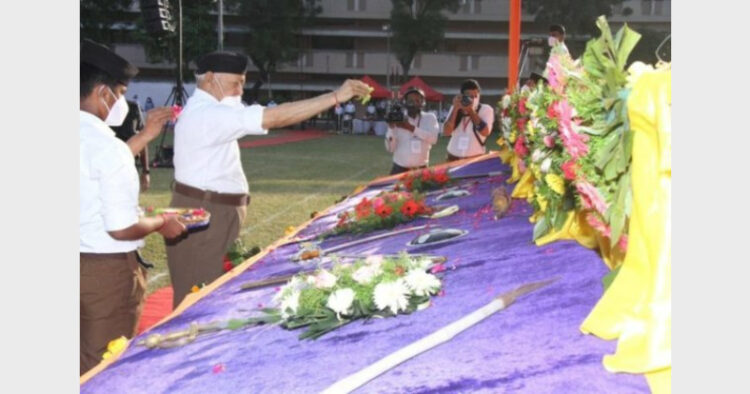RSS Sarsanghchalak Dr Mohan Bhagwat said that population policy should be considered once again and that the policy should be made for the next 50 years.
"The policy should be implemented equally, population imbalance has become a problem," Bhagwat said.
“While reimagining the country’s development one predicament comes to the fore which appears to concern many. The rapid growth of the country’s population may give rise to many problems in the near future. Therefore, this challenge must be duly considered. A resolution was passed on this issue during the Akhil Bharatiya Karyakari Mandal (All India Executive Committee) meeting of Sangh held at Ranchi in the year 2015,” he said.
“The ubiquitous and effective implementation of relevant policies pertaining to these matters will require widespread public sensitisation and impartial actions. In the present circumstances, news of persecution of native Hindus, growing criminalisation and a mounting pressure on them to escape their areas where an imbalanced population growth have surfaced. The violence that broke out following the elections of West Bengal and the pitiable condition of the Hindu people there can also be attributed to the appeasement of barbarous elements by the government and population imbalance. Therefore, a policy that is applicable to all groups in the same fashion is imperative. All of us need to inculcate the habit of considering the collective national interest above everything while coming out of attractive cobweb of milking the parochial group interests,” he added.
ABKM Resolution: Challenge of Imbalance in the Population Growth Rate
Steps taken to control the population of the country have yielded adequate results during the last decade. But in this regard, the Akhil Bharatiya Karyakari Mandal is of the opinion that the severe demographic changes brought forth by the analysis of the religious data of Census 2011 highlight the necessity of the review of population policy. Vast differences in growth rates of different religious groups, infiltration and conversion resulting in religious imbalance of the population ratio, especially in border areas may emerge as a threat to the unity, integrity and cultural identity of the country.
Although Bharat was one of the early countries in the world to announce as early as in 1952 that it will have population planning measures, it was only in the year 2000 that a comprehensive population policy was formulated and a population commission was formed. The policy aimed at achieving a stable but healthy population by the year 2045 by optimising the fertility rate to the ideal figure of 2.1 total fertility rate [TFR]. It was expected that as this aim is in accordance with our national resources and expected future requirements, it will be uniformly applied to all the sections of society. However, the National Fertility and Health Survey [NFHS] of 2005-06 and the 0-6 age group population percentage data of religion in Census 2011, both indicate that the TFR and child ratio is uneven across the religions. This is reflected in the fact that the share of the population of religions of Bharatiya origin which was 88 per cent has come down to 83.8 per cent while the Muslim population which was 9.8 percent has increased to 14.23 percent during the period 1951-2011.
In addition to that, the rate of growth of the Muslim population has been very high than national average in the border districts of border states of the country like Assam, West Bengal and Bihar, clearly indicating the unabated infiltration from Bangladesh. The report of the Upamanyu Hazarika Commission appointed by Hon’ble Supreme Court and several judicial pronouncements from time to time have also corroborated these facts. It is also a fact that the infiltrators are usurping the rights of citizens of these states and are becoming a heavy burden on the already scant resources apart from creating socio-cultural, political and economic tensions.
The religious imbalance of population in the North-Eastern states has assumed serious proportions. In Arunachal Pradesh, the people of religions of Bharatiya origin were 99.21 per cent in 1951. It came down to 81.3 per cent in 2001 and to 67 per cent in 2011. In just one decade the Christian population of Arunachal Pradesh has grown by almost 13 percentage points. Similarly, in the population of Manipur, the share of religions of Bharatiya origin which was more than 80 per cent in 1951 has come down to 50 per cent in 2011. These examples and pointers of unnatural growth of the Christian population in many districts of the nation indicate an organized and targeted religious conversion activity by some vested interest groups.
The Akhil Bharatiya Karyakari Mandal expresses deep concern over all these severe demographic imbalances and urges the Government to –
Reformulate the National Population Policy keeping in view the availability of resources in the country, future needs and the problem of demographic imbalance and apply the same uniformly to all.
Totally curb the illegal infiltration from across the borders. Prepare a National Register of Citizens and prevent these infiltrators from acquiring citizenship rights and purchasing lands.
The ABKM calls upon the countrymen including all the Swayamsevaks to take the cognizance of the causes of these population changes and consider it their national duty to create public awareness and take all lawful steps to save the country from this demographic imbalance.














Comments